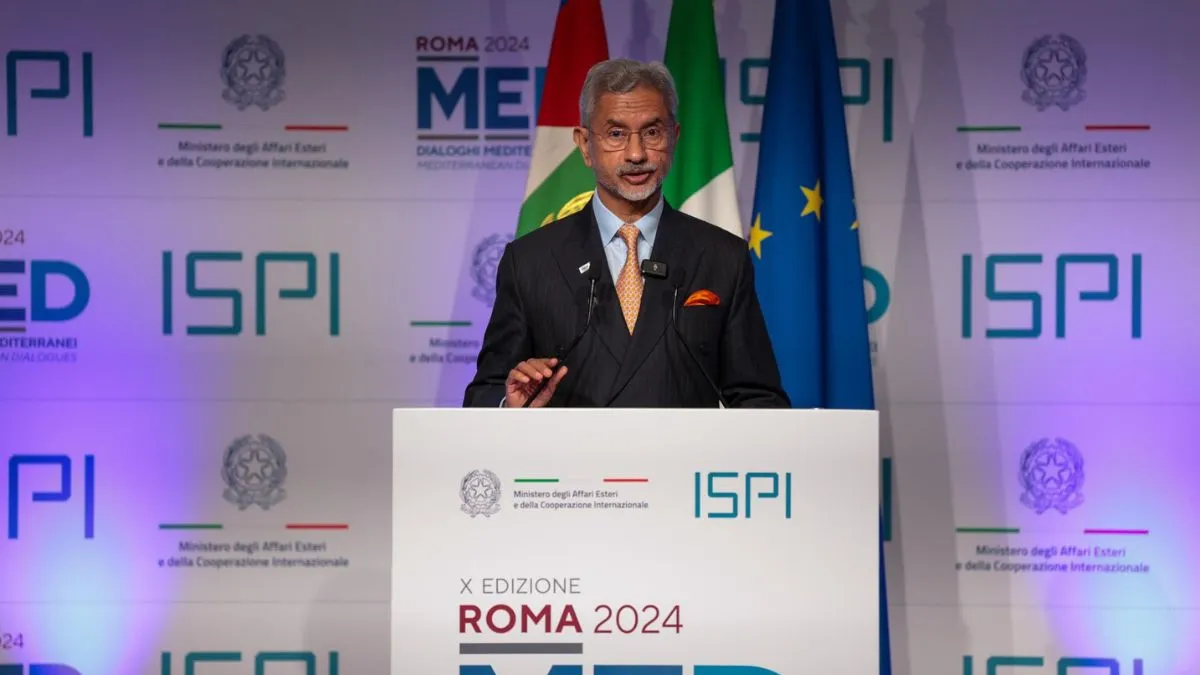Rome: India supports an immediate ceasefire in West Asia and favours a two-state solution in the long-term, External Affairs Minister S Jaishankar said Monday as he condemned terrorism, hostage-taking and civilian casualties in military operations. Speaking at the 10th edition of the MED Mediterranean Dialogue in Rome, Jaishankar said that India regards large-scale civilian casualties in military operations to be unacceptable and added that international humanitarian law cannot be disregarded. "In immediate terms, we should all support the ceasefire... In the longer term, it is imperative that the future of the Palestinian people be addressed. India favours a two-state solution," he said.
Jaishankar raises concerns about wars
Voicing concerns over the widening of the conflict in West Asia, Jaishankar said that India has been in regular touch with both Israel and Iran at the highest levels to advocate restraint and enhance communication. He said an Indian contingent like Italy is in Lebanon as part of UNIFIL. Indian naval ships have been deployed in the Gulf of Aden and the northern Arabian Sea since last year to protect commercial shipping.
United Nations Interim Force in South Lebanon (UNIFIL) has around 10,500 peacekeepers drawn from 50 troop-contributing countries. India has more than 900 people as part of UNIFIL in Lebanon. "Given our capacity to engage various parties, we are always willing to contribute meaningfully to any international diplomatic endeavours," he said.
What Jaishankar said on Russia-Ukraine war
On the Ukraine-Russia war, he said the continuation of this conflict has serious, destabilising consequences, including for the Mediterranean. "What is clear is that no solution is going to emerge from the battlefield. India has consistently held the view that disputes in this era cannot be settled by war. There must be a return to dialogue and diplomacy. The sooner, the better. This is a widespread sentiment in the world today, especially in the Global South," he said.
Since June, Prime Minister Narendra Modi has personally engaged leaders of both Russia and Ukraine to this end, this has included his visiting Moscow and Kyiv, and senior officials remain in continuous touch. "We firmly believe that those who have the ability to explore finding common ground must step up to that responsibility," he added. He said that due to these two conflicts supply chains are insecure, and connectivity, especially maritime, stands disrupted.
Talking about opportunities, he said a closer and stronger relationship between India and the Mediterranean will serve both of us well. "Our annual trade with the Mediterranean nations is about USD 80 billion. We have a diaspora of 460,000, and about 40% of that is in Italy. Our key interests are in fertilisers, energy, water, technology, diamonds, defence and cyber," he said.
He said India's political relations with the Mediterranean are strong, and their defence collaboration is growing, including more exercises and exchanges. He said the Mediterranean presents both opportunities and risks in an uncertain and volatile world. Beyond extrapolating current trends, the new element of our relationship will be connectivity. The India-Middle East-Europe Economic Corridor (IMEC), announced in September last year, can be a game changer, he added. He said that the conflict underway, currently in West Asia has undoubtedly been a major complication, but the IMEC is proceeding ahead on the eastern side, especially between India and the UAE and Saudi Arabia.
India expands trade with other nations
He also talked about the I2U2 grouping of India, Israel, UAE and the US, saying it is expected to be more active in times to come. He said India's trade with the Gulf alone is in the range of USD 160 to 180 billion annually. The rest of MENA (Middle East and North Africa) adds about another USD 20 billion. More than nine million Indians live and work in the Middle East, whether it is energy, technology, industrial projects or services, he said, adding that it is also a region to which we are connected in history, culture and security.
Earlier, Jaishankar met British Foreign Secretary David Lammy and discussed deepening cooperation in technology, green energy, trade, mobility, as well as ongoing developments in Indo-Pacific and West Asia. "Started the day by meeting FS @DavidLammy of UK, in Rome today. Appreciate the steady momentum in India UK Comprehensive Strategic Partnership," he said in a post on X.
The minister said he discussed deepening cooperation in technology, green energy, trade, mobility, as well as ongoing developments in Indo-Pacific and West Asia.
Jaishankar, who arrived here on Sunday on a three-day visit, will participate in the Outreach session of the G7 Foreign Ministers' Meeting in Fiuggi, where India has been invited as a guest country. He is also expected to meet his counterparts from other participating nations in the G7-related engagements and hold bilateral discussions during the visit.
(With inputs from agency)
ALSO READ: Israeli strike in northern Gaza killed 60, mostly women and children: Palestinian medical officials

